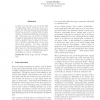Free Online Productivity Tools
i2Speak
i2Symbol
i2OCR
iTex2Img
iWeb2Print
iWeb2Shot
i2Type
iPdf2Split
iPdf2Merge
i2Bopomofo
i2Arabic
i2Style
i2Image
i2PDF
iLatex2Rtf
Sci2ools
123
click to vote
EUSFLAT
2007
2007
Fuzzy Logic as a Theory of Vagueness: 15 Conceptual Questions
In spite of its successes as a tool in the field of engineering, fuzzy set theory has yet to achieve the universal footing that probability theory has across the various fields of mathematics, technology, philosophy and psychology. This paper sets out points of critique brought up regarding the fuzzy approach and seeks to analyze them, focusing on the question of whether anything that can be done about these matters. Do these criticisms have any practical relevance or any relevance with respect to the intended fields of usage. Do they or do they not diminish fuzzy logic’s suitability as a theory of vagueness?
| Added | 29 Oct 2010 |
| Updated | 29 Oct 2010 |
| Type | Conference |
| Year | 2007 |
| Where | EUSFLAT |
| Authors | Jeremy Bradley |
Comments (0)

